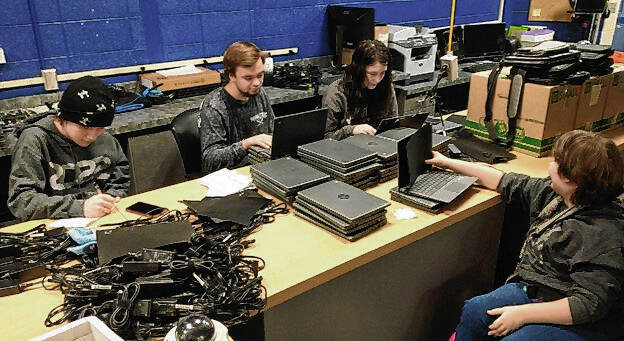By DAVID PHELPS, guest columnist
Technology is not perfect, far from it. We see that imperfection every day as students and teachers alike bring their malfunctioning or broken laptops and Chromebooks to our windowless room in the center of Brown County High School.
Dubbed the “Nerd Cave,” it is more than just a technology office. This is a student-operated repair center where students have the opportunity to earn class credit while working in a real-life work environment.
 Phelps
Phelps
Though it is officially a class with assignments and quizzes, it operates much more like a workplace. All students are trained how to repair the most common issues, but the real emphasis is not on technical knowledge. Instead, the focus is on processes, customer service and demonstrating practical knowledge. Assignments are geared toward how the office operates and the policies that are necessary to know to make sure things work smoothly. That knowledge is then expected to be put into practice as devices come in for repair.
The repair process is not overly complex, but expecting an ever-changing roster of students that are only there for an hour a day to know every part of it without mistake is very idealistic. To make it more streamlined, students are given job titles with specific responsibilities. They are a smaller part of a bigger system and just need to know their part of it well in order for everything to work properly.
One student may be responsible for documenting repairs while another is in charge of keeping an inventory of available parts. One might be overseeing quality control while another is keeping the workspace in order. Those roles have changed and evolved over time, but each of those jobs is important and keeps the overall process moving.
We have also expanded into the Brown County Middle School and have designated students walk up the hill to open a help desk window at specific times throughout the day. It mimics the operations we see at the high school and places trust in those select students to follow those same processes.
Students are not on their own and part of what is important to learn is how to interact with supervisors.
Their work is highly supervised by our technology department staff members Pat Lovell and Samantha Walker. Previous members of the department did a lot of work to put processes in place as well and we continue to build from that. While staff members will proactively check on progress and ensure processes are being followed, students are also encouraged to communicate issues and possible solutions.
As a class, grades are still required, but even that is done differently than what a typical classroom would see. Apart from the basic assignments surrounding how things are done, students are given weekly job evaluations much like a yearly evaluation seen in the workplace. The rubric is focused on how they work together, their motivation, their communication and their ability to maintain good work habits.
Beyond that, they are given a demonstration and training on how to interact with people with the criteria of greeting people, asking questions, being professional and saying goodbye. It seems so simple, but is often a challenge for students with no real experience conversing with people in that way.
Most assignments are based on mastery as well. We want students to know this information, no matter how many times it takes for them to take the quiz. It is far more important that they get it right and progress than that they knew it when it was first presented to them. Grades in the course often appear inflated, but it reflects this idea of mastery.
So, what is the end result of all of this?
On an operational side, we could certainly take a different approach and outsource repairs to a repair company. We’ve done that before and saw repair times that started at two weeks and inflated to two months. With a student team that is able to repair devices in-house, we can cut some of those repairs down to two days or even two hours when our parts are properly stocked.
Now COVID-19 has certainly made it difficult to remain properly stocked due to supply shortages and delays, but we are still operating efficiently where we are able. So operationally, we are functioning quite well with the dozen or so extremely part-time “employees” called students that are learning and growing while providing a service to the school.
But the impact is much greater than that.
Approximately 20 students each year are learning how to engage in a real work environment through this program. They are being challenged to take ownership of this process and we certainly see that taking root.
The person documenting repairs is keeping the technicians accountable for writing things down completely. The office managers are informing people when they are not placing things in the right places. Customer service representatives are acting as quality control for repairs before they go back to a student. It is a growing organism that sees students continually coming back for another term.
Much like the technology we work on, it is not perfect. Mistakes are made and are actually expected. But the experiences that these students are gaining from programs like this are exceptionally meaningful and we should take great pride that these opportunities are available in Brown County Schools.
David Phelps is the director of technology for Brown County Schools. He can be reached at [email protected].





